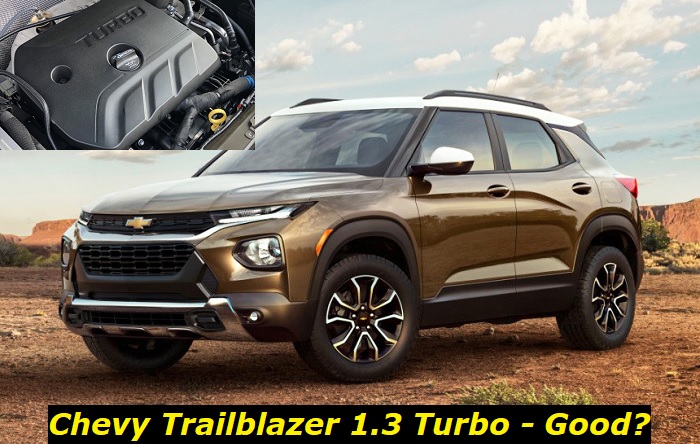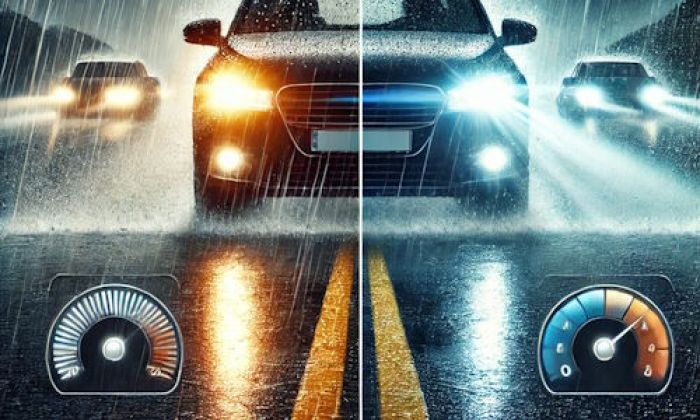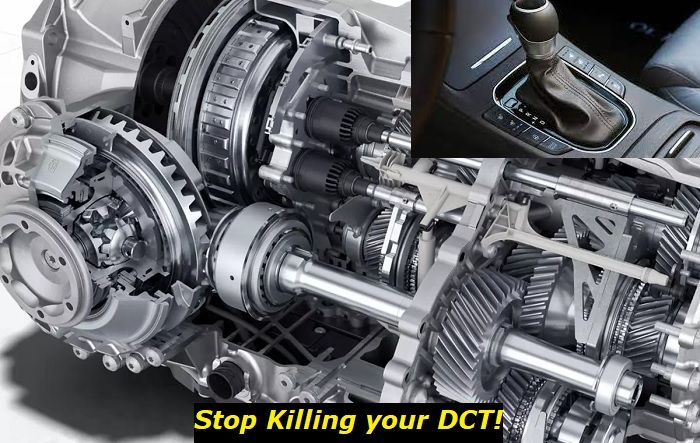The L3T engine is something so weird to see in an American vehicle that we don't even know how to start the article about it. Among our friends who are automotive journalists, car shop mechanics, and car geeks, we can see two groups of people: the one that loves Chevy Trailblazer with the 1.3 Turbo and the other one that hates it.
You can't just be neutral and express no emotions when you are sitting in an SUV that is powered by a 3-cylinder 1.3-liter engine and you actually like how it goes. Kind of the cognitive dissonance, we should say.
So, today, we'll tell you more about the 1.3-liter turbocharged engine that powers the Chevy Trailblazer and will share some cool facts we've been able to find about it.

Key features and my opinion about the engine
- Production years:2018-now
- Average lifespan of L3T:160,000-180,000 miles
- Fuel supply type:direct injection
- Power range:156-163 hp
- Fuel efficiency:good
- Engine block material:aluminum
- Engine reliability score:medium
- The most common problems:start-stop system is faulty, carbon buildup on intake valves, EVAP causes problems, frozen intercooler issues.
Some facts about the 3-cylinder engine for the Trailblazer
Well, this engine is currently found under the hood of two models by GM - the Chevy Trailblazer and also the Buick Encore. Both are small SUVs for city driving, for young families that obviously don't have a lot of money to waste on a good old 3-liter plus engine and on the fuel it will burn.
The engine block and the cylinder head are made of aluminum which makes it actually a single-breakdown engine. Once it malfunctions, you may just throw it away and buy a new one because any overhauling or serious repairs aren't possible.
Here's what we know about the L3T unit:
- it only has 3 cylinders and each cylinder houses 4 valves;
- the displacement of 1.3 liters seems freaking weird for an SUV;
- the turbocharger is one thing in the specs of the engine that gives you some hope;
- direct injection is a good choice, it adds some power;
- the engine offers a whopping 155 hp of power and 174 lb-ft of torque - that's a lot for this size;
- the engine comes equipped with a very decent and new 9-speed automatic transmission.
You may have seen that Trailblazers also have a crazier option of a 1.2-liter 3-cylinder engine for FWD models. They come equipped with CVTs which makes them a total waste of your money. But thank goodness, Chevy decided to use a 9-speed transmission for the 1.3-liter version with AWD.
Gosh, we can't believe we are writing this, but this small 3-cylinder unit is made for the all-wheel drive versions of the Trailblazer and Encore which makes things even weirder.
So, our main task for today is to answer if this engine is actually good to buy and if you will love driving a vehicle equipped with it.
What are the main pros and cons of Chevy's 1.3 Turbo engine?
Here are some of the main pros:
- This is a very economical unit with about 31 mpg (combined).
- The engine is not expensive, the MSRP of the Trailblazer is about $23K.
- The transmission is really cool and is thought to be reliable.
- The power and torque are wonderful, you won't feel any problems.
And here are some cons:
- This engine is not thought to be very durable.
- The turbocharger is quite expensive and it works at the top of its possibilities here.
- Too much power from this displacement will mean a lot of minor problems.
- Your actual gas mileage may be much different from what Chevy predicts.
What's the estimated longevity of the Chevy Trailblazer 1.3 Turbo engine?
We can't say for sure now because the engine is quite new and we doubt there is a single Trailblazer 1.3 owner who has already made more than 150,000 miles. But we think not all of them will ever make that many miles.
When you are buying a very small engine with 3 cylinders, you should understand that this will be the first expensive part that will let you down. Americans hate small engines exactly because they aren't reliable.
The Trailblazer 1.3 Turbo L3T will probably last about 120,000 miles like most other 3-cylinder turbocharged engines. And yes, you will need to invest some money in it along the way. But it's not that bad if you think about the pros.
Let's face it, not many people will buy a new Chevrolet to drive it for more than 120K miles. An average driver will keep a car for 6 years and then sell it to a dealer or to a private buyer. So, the 1.3 Trailblazer will be completely enough for this.
What are the common problems with the Chevy Trailblazer 1.3 Turbo engine?
We can't say what are the most common problems because the engine has been around for not a long time at all. But we can predict problems and also gather opinions from car mechanics that have already dealt with some of these engines. By the way, they all say that the engine is surprisingly good and has the potential to last longer than other 3-cylinder turbocharged engines like the Ford's 1.0 EcoBoost, for example.
Here are still some problems to be aware of if you want to buy a Trailblazer:
1. Unpredictable longevity
You never know when this engine may get broken. We mean, this information will be available after 3 or 4 years when a lot of engines will pass the 100,000-mile mark. For now, we can say that a 155-horsepower 1.3-liter engine doesn't look like it will live longer than 120K miles.
There is still an advantage of a budget-friendly price. We believe you'll be able to buy a replacement engine for up to $5,000 or a used engine with low mileage on it for $3,500. So, even if your Trailblazer engine lets you down, it won't hurt your budget very badly.
2. Need to rotate it like hell
If you want to get decent power, you will need to rotate the engine up to 5600 RPM where the peak point power is located. This is not going to be good for engine longevity. Though the peak torque is available at 1600 RPM and this saves the situation. This engine will feel like a diesel unit, but we should say that the 155-hp power is not achievable on a daily basis.
If you rotate the engine that badly, you will get it broken in a month or two.
3. Residual value of your Trailblazer
Again, it's our prediction because you can't say now what your car will cost in five years. Chevy has never made such vehicles before, so we can't even compare anything. But one thing we can say for sure - the 1.3 Turbo Trailblazer is not going to cost a lot in 5 or 6 years. Its residual value is likely to be very low.
Just look at Ford Fiesta with the 1.6 engine and Ford Fiesta with the 1.0 EcoBoost - you'll see that small engines are not popular on the market and no one wants to buy them used. Naturally, they are packed with problems even after they get not a lot of miles on them.
So, if you are planning to sell your vehicle at a good price, the Trailblazer 1.3 is not your choice - you will most likely lose a lot of money.
4. Problems in cold weather
We have already seen some reports about problems with the 1.3 Trailblazer in winter. Especially, if you live in northern states, you will suffer from these problems. The engine is hard to heat properly because it's small and uses all the power to rotate the wheels. It barely can warm up even after 10 minutes of driving in winter.
And this can lead to ice buildup in some parts of air intake and on sensors. If this happens, you will have to go to the dealer or let your car melt a little in a warm garage. Anyway, these problems are now being discussed in some forums and they seem to be very common for the 1.3 Turbo.
5. Vibrations
This is a three-cylinder engine and it will vibrate badly in some situations. For example, at certain RPMs, the engine will share some vibrations with your Trailblazer and you will even feel them on your steering wheel and pedals. This is bad, but this is something you need to put up with.
Although GM did a great job and normally you won't feel any excessive vibrations, sometimes they will get on your nerves and spoil your mood. There is nothing you can do unless one of the engine mounts is broken.
What do we think about the 1.3 Turbo engine in the Trailblazer?
Well, we believe this is a good try for General Motors to win some time before turning completely to electric vehicles and hybrids. This is a cheap engine with small displacement that is still able to fit EPA requirements for ecology. And for another 5 or 7 years, Chevy can make cars with purely gasoline engines which is not bad for your budget.
Unfortunately, the epoch of the big-displacement engine has come to an end. In 10 years you will not be able to buy a new diesel or gasoline vehicle, so we need to understand that these technologies have already started their last decade. And the 1.3 Turbo L3T by GM is not a bad way to prolong the life of these old good technologies.
But still, we love how these engines go and what power and torque they offer. So, it's not just about their ecology standards and low fuel consumption, it's about their good performance, too.
About the authors
The CarAraC research team is composed of seasoned auto mechanics and automotive industry professionals, including individuals with advanced degrees and certifications in their field. Our team members boast prestigious credentials, reflecting their extensive knowledge and skills. These qualifications include: IMI: Institute of the Motor Industry, ASE-Certified Master Automobile Technicians; Coventry University, Graduate of MA in Automotive Journalism; Politecnico di Torino, Italy, MS Automotive Engineering; Ss. Cyril and Methodius University in Skopje, Mechanical University in Skopje; TOC Automotive College; DHA Suffa University, Department of Mechanical Engineering






Add comment